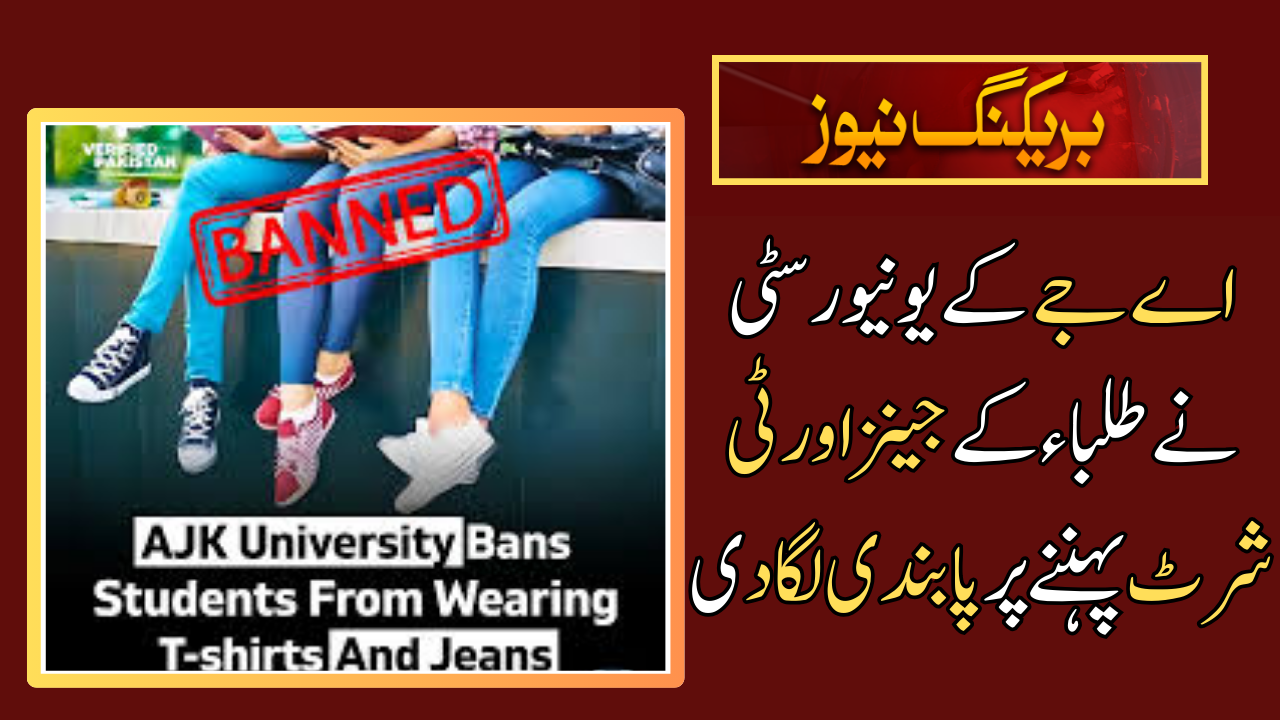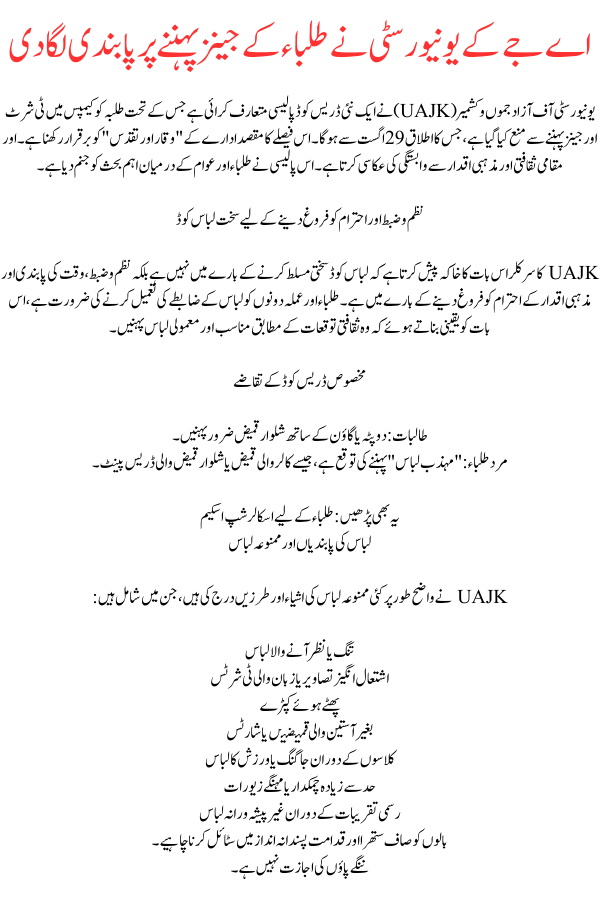AJK University Bans Students From Wearing Jeans
The University of Azad Jammu & Kashmir (UAJK) has introduced a new dress code policy that prohibits students from wearing T-shirts and jeans on campus, effective from August 29. This decision is aimed at maintaining the “dignity and sanctity” of the institution and reflects a commitment to local cultural and religious values. The policy has generated significant discussion among students and the public.
Strict Dress Code to Foster Discipline and Respect
UAJK’s circular outlines that the dress code is not about imposing rigidity but fostering discipline, punctuality, and respect for religious values. Both students and staff are required to comply with the dress code, ensuring they dress appropriately and modestly according to cultural expectations.
Specific Dress Code Requirements
- Female Students: Must wear shalwar kameez paired with a dupatta or gown.
- Male Students: Expected to wear “decent dress,” such as dress pants with collared shirts or shalwar kameez.
Also Read: Scholarship Scheme for Students
Clothing Restrictions and Prohibited Attire
The UAJK has clearly listed several prohibited clothing items and styles, which include:
- Tight or see-through clothing
- T-shirts with provocative images or language
- Torn clothing
- Sleeveless shirts or shorts
- Jogging or exercise attire during classes
- Overly flashy or expensive jewelry
- Unprofessional clothing during formal events
- Hair must be clean and styled conservatively
- Bare feet are not permitted
Also Read: CM Internship Program
Maintaining a Professional Image on Campus
The dress code emphasizes that both students and faculty should promote a positive image of the university. This policy encourages flexibility but ensures that cultural and religious standards are upheld while maintaining high morale. The university sees this initiative as a way to create a respectful and cohesive environment for all.
Furthermore, the AJK University Bans Students From Wearing Jeans will be taken against those who violate the dress code policy, urging everyone to adhere strictly to the outlined rules.
Also Read: BISP with World Food Programme
Impact of the Dress Code on Campus Life
Students and staff are expected to follow the dress code across all university premises, including classrooms, cafeterias, and university offices. The move aims to elevate the institution’s professional standards while respecting local customs and religious traditions.
This dress code also addresses safety concerns and promotes a harmonious environment. Some students have expressed concerns about the new rules, stating that they feel restrictive, while others view it as a step toward discipline and decorum.
Also Read: Ahsan Ayaz Reaches Final of International Squash Championship
Potential Reactions and University’s Stance
UAJK has clarified that the policy is not intended to be overly rigid but seeks to establish a respectful and dignified atmosphere. The AJK University Bans Students From Wearing Jeans encourages open dialogue with students to address any concerns, with officials stating that the policy is meant to respect the diverse backgrounds of the student body while ensuring everyone adheres to the same standards.
While the policy has been well-received by some, it has sparked debates regarding personal freedom and expression. The university continues to stand firm on its stance, emphasizing that the dress code is in line with cultural and religious values.
Also Read: Retirement Scheme for Employees
Frequently Asked Questions (FAQs)
Q1. Why did UAJK University Bans Students From Wearing Jeans code policy?
A: The policy aims to promote discipline, respect for religious values, and the institution’s dignity while fostering a professional and culturally appropriate environment.
Q2. What are the specific dress code requirements for male and female students?
A: Female students must wear shalwar kameez with a dupatta or gown, while male students are expected to wear dress pants and collared shirts or shalwar kameez.
Q3. What attire is prohibited under the new dress code?
A: Prohibited items include tight or see-through clothing, shorts, sleeveless shirts, T-shirts with provocative language, excessive makeup, and unprofessional attire in formal settings.
Q4. Will there be any consequences for violating the dress code?
A: Yes, disciplinary actions will be taken against students or staff who do not comply with the dress code.
Q5. How does the university plan to address concerns about the policy?
A: UAJK officials are open to discussions with students and staff to ensure that the policy is implemented smoothly and respectfully.
Also Read: PM Shehbaz Declares Education Emergency
Read More: Click Here for More Updates


